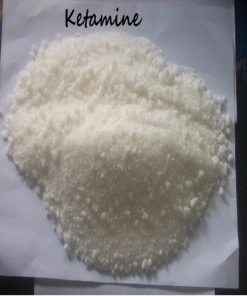Ketamine powder
Ketamine powder
Ketamine powder, Ketamine is used by medical practitioners and veterinarians as an anaesthetic. And, It’s sometimes used illegally by people to get high.
First, Ketamine is a dissociative drug, which means it acts on different chemicals in the brain to produce visual and auditory distortion, and a detachment from reality.
When it’s sold illegally, ketamine usually comes as a white or off-white powder. Also, It can also be made into pills, or dissolved in a liquid.
And, Clinical trials and studies are assessing ketamine as a treatment for depression. Early indications show good results.
Other names
Special K, K, ket, kitkat, super k or horse trank.3,4
How is it used?
Ketamine can be swallowed, snorted or injected. It’s also sometimes smoked with cannabis or tobacco. Furthermore, The effects of ketamine may be experienced within one minute if injected, 5–15 minutes if snorted, and up to 30 minutes if swallowed. Too, Its effects can last for around an hour, however an individual’s coordination or senses may be affected for up to 24 hours after initial use.4
Effects of ketamine
There is no safe level of drug use. Too, Use of any drug always carries some risk. It’s important to be careful when taking any type of drug.
Ketamine affects everyone differently, based on:
size, weight and health
whether the person is used to taking it
whether other drugs are taken around the same time
the amount taken
the strength of the drug (varies from batch to batch)
The following effects may be experienced:
feeling happy and relaxed
feeling detached from your body (‘falling into a k-hole’)
visual and auditory hallucinations
confusion and clumsiness
increased heart rate and blood pressure
slurred speech and blurred vision
anxiety, panic and violence
vomiting
lowered sensitivity to pain3,4,6
Overdose
If you take a large amount of ketamine or have a strong batch, you could overdose.
Not only but also, The risk of death from ketamine alone is low, due to its ability to cause unconsciousness with minimal impact on airway reflexes or blood circulation. However, individuals are at a higher risk of physical harm/accidents while under the influence of the ketamine.
Call an ambulance straight away by dialling triple zero (000) if you or someone else has any of these symptoms (ambulance officers don’t need to involve the police):
inability to move, rigid muscles
high blood pressure, fast heartbeat
convulsions
unconsciousness and ‘near death’ experiences
death. 3,6,5
Coming down
The day after using ketamine, you may experience:
memory loss
impaired judgement, disorientation
clumsiness
aches and pains
anxiety.3,6,6
Long-term effects
Regular use of ketamine may eventually cause:
flashbacks
poor sense of smell (from snorting)
mood and personality changes, depression
poor memory, thinking and concentration
abnormal liver or kidney function
ketamine bladder syndrome (see below)
abdominal pain
needing to use more to get the same effect
dependence on ketamine
financial, work and social problems3,6
Ketamine bladder syndrome
Large, repeated doses of ketamine may eventually cause ‘ketamine bladder syndrome’, a painful condition needing ongoing treatment.
Symptoms include difficulty holding in urine, incontinence, which can cause ulceration in the bladder.
Anyone suffering from ketamine bladder syndrome needs to stop using ketamine and see a health professional.3
Using ketamine with other drugs
First, The effects of taking ketamine with other drugs– including over-the-counter or prescribed medications – can be unpredictable and dangerous, and could cause:
Ketamine + alcohol or opiates: When used with other depressant drugs, the combined effects may lead to the functioning of the heart or lungs to slow or stop, and can result in death.68
Ketamine + amphetamines, ecstasy and cocaine: enormous strain on the body, which can lead to fast heart rate.3,8
‘Polydrug use’ is a term for the use of more than one drug or type of drug at the same time, or one after another. Moreover, Polydrug use can involve both illicit drugs and legal substances, such as alcohol and medications. Find out more about polydrug use.
Showing all 2 results
-
Pain Pills
Buy Roxicodone Online Without Prescription
$1.0 – $3.0 Select options This product has multiple variants. The options may be chosen on the product page -
Injectables
Ketamine Powder Online Suppliers
$300.0 – $6,800.0 Select options This product has multiple variants. The options may be chosen on the product page

